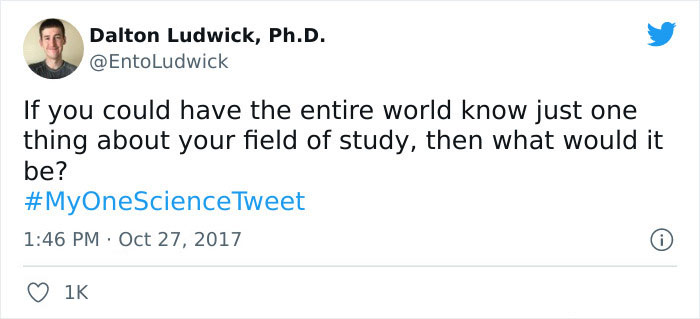
35 Scientists Share That “One Science Fact” They Wish The Whole World Would Know
Each and every single one of us has at least one pearl of wisdom that we feel needs to be shared with everyone else. Something that the world definitely needs to hear. A piece of information, a tiny parcel of a fact that might change everything for the better. Scientists are no different in that regard. They do, however, have access to far more interesting facts and revelations than anyone not from their field. From biology, physics and chemistry to medicine and beyond.
Today, we're bringing you a whole host of intriguing science facts and opinions about science. All those brainy and bright scientists shared their insights under the #MyOneScienceTweet hashtag, started by entomologist Dalton Ludwick, and it’s eye-opening, to say the least.
Scroll down, upvote the facts you thought were the most illuminating, and let us know in the comments what you think. We can’t wait to hear your top science facts, too, Pandas!
Bored Panda wanted to learn more about the way good scientists should approach things and why there have recently been more people mistrusting science in general, so we reached out for a chat to Steven Wooding, a member of the Institute of Physics in the UK. He is also a member of the Omni Calculator Project which hosts a lot of interesting and frankly fun tools like the Weird Units Converter.
To start things off, Steven shared with Bored Panda the most interesting science fact that he knows: "A photon created at the sun's center takes up to 100,000 years to get to the surface but then only 8 minutes to get to Earth. Due to the density of the sun, the newly created photon encounters an atom after a few millimeters; it is absorbed then re-emitted in a random direction. So most of the time, it will not be making progress towards the surface. Once in the emptiness of space, most photons make an uninterrupted journey to Earth." We're willing to bet you probably didn't know that, dear Pandas.

This post may include affiliate links.
Steven told Bored Panda that the fundamental basis of the scientific method involves proposing an idea of how the world works and then proving it by experiment. In short, scientists have to set their egos and feelings aside for the sake of getting a step or two closer to the truth. However, that's far easier said than done! We sometimes forget that scientists are human beings just like we are.
"To be a good scientist, you have to be open to your original notion being wrong. However, scientists are also humans, so it can be incredibly tough emotionally to accept that you are wrong. It's best to look at the bigger picture of human knowledge and progression. You being proved wrong will help focus effort on other ideas that might be correct. In this way, you play your part in building knowledge," the scientist explained.
It's impossible to argue against this and it a good explanation of why god doesn't exist. If it created us to be the master species, why did it make us so selfish and irresponsible as a whole? "I have created people to destroy this planet in a relatively short period of time. Not one of my best ideas, but I've had enough, really."
Steven agrees with the idea that there generally seems to be less trust in scientists and science itself by the public. "You have to have an open mind to accept ideas from others. A great example is the flat earthers. They what to check and verify that the Earth is round by themselves and don't trust anything anyone says on the subject," he pointed out how some people can be misguided.
"One reason for mistrust in the latest science is that the public see the scientific method playing out in real-time. As more data comes in, the scientists change what they say, which can confuse the public. They may see a scientist admit they were wrong, which raises doubts about everything scientists say. A better understanding of the scientific method would certainly help the public's trust in science," the expert shared a possible reason for all the mistrust.
A major study published this week estimated 1.2 million deaths last year from drug-resistant infections. That's more than malaria or AIDS and it's only getting worse.
Drives me nuts when people complain about scary "chemicals" or "toxins", but are completely unable to say exactly which chemical is bad or why. Or assume anything with a long scientific name is bad. Just consider the dangers of dihydrogen monoxide, it causes thousands of deaths and millions in property damage, but that doesn't mean we should ban it.
One thing that many of us are likely to agree on is that the flood of information in the Digital Age can be overwhelming at times. It sometimes makes us dream of running away to an uninhabited island that doesn’t have tech or internet access. Alas! Not everyone has that luxury.
So the next best alternative is learning to navigate the choppy waters of information overload. We’ve got to learn to distinguish between reliable and unreliable sources, and learn to fight back against our diminishing attention spans.
This. February 2020 to January 2022, for example. New/more data means you change conclusions. If it's science.
Entertainment and pop culture expert Mike Sington from Hollywood knows all about how info overload, especially on social media, can make it hard for some of us to distinguish between facts and fiction. Earlier, he went into detail with Bored Panda about some of the red flags we should watch out for, indicating that a fact or source isn’t trustworthy.
"Red flags to watch out for that a claim may be fake: it's outlandish, it's too good to be true, you haven't seen the claim anywhere else, you've never heard the source, the source isn't reputable, you can't find two other sources making the same claim, your gut tells you, 'this can't be true,'" Mike shared.
Just 100 corporations are responsible for 71% of global emissions. So stop blaming the population. Start with the 100 corps. https://www.theguardian.com/sustainable-business/2017/jul/10/100-fossil-fuel-companies-investors-responsible-71-global-emissions-cdp-study-climate-change
Less than 10 percent will ever wake up at all. If you have to do CPR and the person still dies, you didn't do anything wrong. Do not feel any guilt.
"The rise of social media has decreased the reliability of information because misinformation can spread so quickly before it can be corrected," the entertainment industry expert shared.
Even a simple Google check can help fight back against the spread of misinformation. If you take the time to double-check something that sounds iffy, you’re better off than you’d be if you just straight-up believed it. If you can’t find any reliable sources backing up the ‘fact,’ odds are that it’s fake.
Yes! It's just a few people every year that gets killed by a shark, humans on the other hand kill lots of sharks all the time. They are of utterly importance to the oceans!
This should be #1. The biggest problem in science is biases because it cripples growth. The Earth remained the center of the universe for 1000s of years longer than it should because we knew that it was true. Millions of women die unnecessarily every year from heart attacks because the entire detection and treatment regime was developed on men. Contextual biases like racial profiling have dramatically affected the African American community's treatment options for chronic diseases. Way too much psychological theory is all based on first world1 8-22 year old college students who, unsurprisingly, do not reflect the overall psychological spectrum of our planet. How many of us can say our own psyche worked the same at 8, 18, 38, and 88? Outright racism gave Hitler proof the Jews were inferior.
Mike suggests that everyone should remain skeptical and try to find additional evidence and supporting sourcing before reposting any bit of info. Otherwise, they might be contributing to the problem. “Amplification doesn’t make a claim true or accurate," he said that just because a lot of people believe something doesn’t make it true.
The expert pointed out that the personally trusts the Associated Press, Reuters, and The New York Times the most. "They employ fact-checkers and editors that ensure the information they post is correct. They’re basically doing the research and homework for you," he told Bored Panda.
100%. I don't know a single domestic cat who's ever been responsible for a wind farm.
"There are literally too many online sources to list that can’t be trusted and should be avoided. Anyone can basically post anything they want… proceed with caution.”
Mike noted that our attention spans have been “reduced to mere seconds at a time.” That’s because this is the way that information and entertainment are fed to us right now.
“People get tiny bite-sized bits of news by scrolling a Twitter feed, they entertain themselves by scrolling quickly through Instagram and TikTok. It’s creating a habit that doesn’t have to be," he warned.
"The good news is there’s plenty of long-form entertainment and news available, you just have to seek it out. I believe the benefit is worth it. I’ve discovered it improves your ability to focus, it’s more calming, you retain more information, and it gives you a more balanced and nuanced view of the world."
Again . . . birth control would reverse this cycle. Human answer to just about everything is MORE MORE MORE, and supply will NEVER keep up . . .
I work in a hospital lab, we run 24/7 to get results for patients. We get almost no recognition despite how qualified and hard we all work. Hospitals would not be able to operate without us, unless you just want to guess how sick people actually are. Same goes for pharmacy
This is why the US practice of 8 weeks of maternity leave is so damaging. I firmly believe that one parent needs to stay with kids until they're old enough for school, and it doesn't matter which parent. The fact that families now need two full-time incomes to survive is proof that capitalism is deadly to a healthy society.
There is a whole industry about this for years. From how we can learn how to compute like a cell to collecting water like a beetle
From all of the light thrown out by the sun, a miniscule amount of it reaches the earth, but it's enough to keep the planet alive and it will do this for billions of years.
I really wish there is a way to report trollers like @DillonHughes
Hmm, they're the current creatures mostly closely related to dinosaurs, you mean.
"Baby Sign Language" is a thing many parents of hearing children teach their babies to facilitate early communication and is thought to HELP with spoken language development. I can't understand why parents of deaf children would deny their children a useful communication tool like sign language.
Microplastics are an issue. There is still emerging research on how it affects our biome
When wolves were reintroduced to Yellowstone national park, revenues from fishing went up. Wolves ate deers, allowing more trees and shrubberies to grow, reducing erosion, leading to cleaner water in rivers and streams, increasing fish populations leading to more recreational fishing with more licenses and gear sold.
Uh, wouldn't all psychological things be connected to brain mechanisms?
No idea what the animal in the photo is, could another Panda please tell me?
Without bacteria, when we are children our immune systems won't develope as well. They need to be introduced to it in order to develope. Of course not the awful ones. But basic environmental stuff that is non-harmful, but we come across in everyday life. When I was born I spent 48 days in an incubator and didn't go home until I was 3 months old. In the nursery that long. When I got home my Mom didn't sterilize by bottles, just washed well in dishsoap and rinsed well in very hot water. My grandmother went ballistic. Mom said "She's just spent 3 months in the nursery. She wouldn't know what to do with a germ if she came across one. Her body has to learn that.". Said back in the mid 50's and since proven scientifically correct. Science has shown that antibacterial soaps aren't doing kids any favors.
Oh how true! Not just the immune system effects. It not only can make you nauseous, but the cells of your digestive system are the fastest replicating cells in your body. Mouth sores that make it not only difficult to eat, but also drink and talk. Anemia and need for transfusions. Get too much of a certain kind of chemo, you can lose your hearing. Until we can develope targeted therapies, chemo isn't picky about what cells it will go after. Even healthy ones.
If you destroy all religious texts and all scientific texts, eventually, all the scientific texts will be recreated. But the religious texts might never come back at all, because they cannot be proven through trial and error.
This should be higher. The push to maximize crop output has created a scenario where all crops could be destroyed by a single event due to their homogeny. Multiple strains have a better chance of at least one or more surviving in the event of a disaster.
Yes. No need to ditch culture to obtain modernity. You can be modern while being cultural
All dialects operate under shared conventions so that they can function as communication between people who share those conventions in the context in which they are used. But rules are taught to increase clarity, beyond informal, familial speech. Sometimes people take them too far: in English, a dangling participle invites confusion, but a strict rule against dangling participles requires a formalism up with which we shall not put. But, it's still good advice to avoid them.
75% percent of all known organisms are beetles, which means that there's a 1 in 4 chance that anyone you meet is SECRETLY A BEETLE! -Emily from QC
This is why I don't agree with this insistence that all life in the universe needs water. All (or most?) of the organisms that evolved on Earth evolved to use water and oxygen because that's what was what was available here. We evolved to take advantage of it! Heck, maybe we're the outliers in the universe if liquid water is so rare.
Tell that to a little girl back in the 60's who so wanted to be an astronomer. Needless to say, I'm not an astronomer, but it's a pretty great hobby.
Not weird but thanks for labeling such a large population of the world based on your world views. I would think that someone who understands science would be aware of how eggs of all kinds have provided a good source of food for for millions of years.
My family had a few dozen songs that we sang as a family on long car trips. Silly songs, love songs, clever songs, rounds... Also carols that we sang on Christmas eve... so many times, so much music. None of us was trained singers, no one played an instrument, but we had lots of music.
Hmmm. Not buying this one. I can drink cheapo wine straight from the barrel all day, but one glass of supermarket plonk and I have the headache from hell.
All but one lineage of dinosaurs did go extinct. The ones that didn't go extinct solved natural challenges in ways other than those which defined the dinosaurs. Dinosaurs could run without losing their breath; birds fly. Dinosaurs maintained heat by using their size; birds developed quills (which dinosaurs did have) into complex feathers (which no, all but the dinosaurs which evolved into birds did NOT have). Calling a bird a dinosaur makes little more sense than calling a human a lungfish.
Conserve it all. It makes me sick to my stomach when I see plastic and oil slicks and fishing lines. The ocean creatures are living innocent lives out there. We are FAR from innocent. We are the most guilty species on earth. Also, if it's beautiful, everyone has to go yhete to see it, yhus wrecking it. People should NEVER have been allowed to visit the Gallopigos. Get us the hell out of there now except for those trying to save it. And please, close the hotel on Kangaroo Island. Back to arriving on the ferry in the morning and leaving at night. Only the conservationists who work there get to stay.
Farmers are aware of this and have generations of land conservatorship experience. When farms are taken over by companies, Like corn and soy for commercial use, that is when conservation usually goes out the window. Fallow fields and natural pesticides have been around farms for thousands of years.
Dinos are still part of it but it's mostly other living things because they have more biomass. Right? Dinos are made of carbon too...
Nobody should swim with dolphins. We should leave these animals alone.
I'm not sure which point the OP is trying to make. First, most snow doesn't melt. It sublimates. A solid sublimating is sort of the equivalent to a liquid evaporating. Secondly, permafrost isn't pure water. So it doesn't simply run off. Rather, it soaks deeper into the ground... but it doesn't really go anywhere. This has huge ecological implications, especially given the large volume of organic matter caught in the permafrost.
I'm not comfortable with this seemingly dogmatic take on the subject.
Wildfires are not "bad". They have been around millions of years longer than we have. Many ecosystems ans species depend on them.
They are very bad in Australia when they have become unprecedented in size, the air quality becomes dangerous and millions of animals are lost to the flames
Load More Replies...Just 222 (including mine) up - vote clicks??????????????? What does it tell you about people?
Wildfires are not "bad". They have been around millions of years longer than we have. Many ecosystems ans species depend on them.
They are very bad in Australia when they have become unprecedented in size, the air quality becomes dangerous and millions of animals are lost to the flames
Load More Replies...Just 222 (including mine) up - vote clicks??????????????? What does it tell you about people?

 Dark Mode
Dark Mode 

 No fees, cancel anytime
No fees, cancel anytime 



















































































































































































